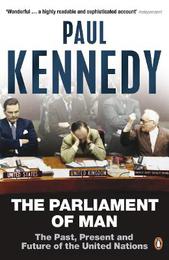
|
The Parliament of Man: The Past, Present and Future of the United Nations
Paperback / softback
Main Details
| Title |
The Parliament of Man: The Past, Present and Future of the United Nations
|
| Authors and Contributors |
By (author) Paul Kennedy
|
| Physical Properties |
| Format:Paperback / softback | | Pages:384 | | Dimensions(mm): Height 198,Width 129 |
|
| Category/Genre | History |
|---|
| ISBN/Barcode |
9780140285871
|
| Classifications | Dewey:341.23 |
|---|
| Audience | |
|---|
| Illustrations |
None
|
|
Publishing Details |
| Publisher |
Penguin Books Ltd
|
| Imprint |
Penguin Books Ltd
|
| Publication Date |
26 July 2007 |
| Publication Country |
United Kingdom
|
Description
In the course of the twentieth century, there occurred a development unique in the story of humankind. States, which had defined themselves from Thucydides to Bismarck by their claims to sovereign independence, came together to create international organizations to promote peace, curb aggression, regulate diplomatic affairs, devise an international code of law, encourage social development and foster prosperity. The emergence of this network of global governance was not straightforward and the debate about its role is just as heated today as it was generations ago. In this long-awaited new book, Paul Kennedy, probably the best-selling historian now living, examines this key development in the history of our century. Beginning with the earliest forms of international organization, he goes on to trace the creation and changing role of the UN in the postwar era, and finally suggests how, in the face of new threats to security and the continued vigour of at least some nation states, the institution will need to change over the course of the twenty-first century.
Author Biography
Paul Kennedy is the author or editor of thirteen books, including Preparing for the Twenty-first Century and The Rise and Fall of the Great Powers, which has been translated into more than twenty languages. He serves on the editorial board of numerous scholarly journals and has written for The New York Times, Los Angeles Times, The Atlantic Monthly, and several other publications. Educated at Newcastle University and Oxford University, he is a former fellow of the Institute for Advanced Studies at Princeton University and of the Alexander von Humboldt-Stiftung in Bonn.
Reviews"An artful study . . . that helps to set the record straight. . . . His assemblage of data is extraordinary." --"The New York Times" "Kennedy traces this . . . story with concision, grace, and fairness. Nearly every page contains some delicious morsel . . . reflecting Kennedy's intelligence and deep knowledge of world affairs." --"San Francisco Chronicle" "Amid the morass of commissions and conferences, and failures like Rwanda, he manages to find something convincingly heroic." --"The New Yorker" " An artful study . . . that helps to set the record straight. . . . His assemblage of data is extraordinary." -- "The New York Times" " Kennedy traces this . . . story with concision, grace, and fairness. Nearly every page contains some delicious morsel . . . reflecting Kennedy' s intelligence and deep knowledge of world affairs." -- "San Francisco Chronicle" " Amid the morass of commissions and conferences, and failures like Rwanda, he manages to find something convincingly heroic." -- "The New Yorker"
|